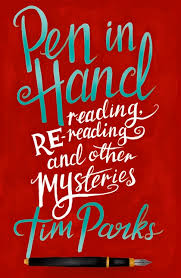Tim Parks, “Pen in Hand, reading, rereading and other mysteries”

Tim Park’s essays are always a pleasure to read. Short and always packed with information. Some of it familliar, some of it unexpected. Pen in Hand is a collection of essays that mostly appeared in the New York Review of Books Daily between 2014 to 2017. There are many to choose from but one particular one entitled “Too Many Books?” has a fascinating section on patronage for the independent writer, the history of mass printing and accessing mass audiences and with it the evoluion of the concept of copyright.
Here is an excerpt:
…in the early 1300s, with the establishment of the first partially mechanized paper mills in Italy, a more generous supply of paper began to circulate and the number of people able to write rapidly increased. All the same, the only way to have more than one copy of what you’d written was to write it out again on another piece of paper, or pay someone else to do that for you. These limitations naturally encouraged people to keep things short and to invest the act of writing with a certain solemnity.
For centuries, if what you had written was going to be shown to others, it would have to be placed in a library, usually a church library. And since the one of the only ways anyone would know that a new piece of literature had been written was if the writer personally put the word around, there would usually be some kind of social connection between writer and readers. At best, then, you could appeal to a literary elite, sharing the same written language — Latin — that was inaccessible to the masses. Perhaps the offspring of these elite would also read you. In fact it was easier to imagine a reputation in centuries to come than widespread diffusion in one’s own time. The perception was that the essential quality of writing was its separation of mental material from mortal grey matter. Word and idea were disembodied and stabilized in order to travel through time, not to be infinitely multiplied in the present.
In general, then, the conditions for supporting the independent professional writer who makes a living from his work just weren’t there. At most, one could hope to come under the patronage of a king, or a city state, or the Church. You could be commissioned to write a treatise or a history. These were not the circumstances where it would be easy to write things your patrons didn’t agree with. Or you might attach yourself to a theater company, where actors would repeat things you had written, though not necessarily word for word. Now your writing might travel a little if the theater company traveled. But most likely it wouldn’t. Traveling companies would not be performing elaborately scripted plays until the sixteenth century.
With the arrival of print in the late fifteenth century, it was suddenly possible to start thinking of a mass audience; 20 million books had been printed in Europe by 1500. Yet it was the printing shops—often more than one if a book was popular—rather than the authors, who made the money. You might write out of a passion to get your ideas around, or out of megalomania—never a condition to be underestimated where writers are concerned—but there was still no steady money to be had producing writing of whatever kind. In economic terms, it was hardly worth insisting you were the author of a text, hence the anonymous book was rather more common than it is today.
Meantime, with this new possibility of printing so many books it made sense to start thinking of all those people who didn’t know Latin. The switch to writing in the vernacular had begun; this meant that, though more copies were being sold, most books were now trapped inside their language community. There were scholars capable of translating of course, and a book that made a big impression in one country would eventually be translated into another. But it took time, and it wouldn’t happen if a book didn’t impress in its original language. Nor for the most part were these translators under contract with publishers. Initially, they were simply scholars who translated what they were interested in and what they believed was worth disseminating. Think of that.
In 1710, Britain’s Queen Anne introduced the first of a series of laws recognizing an author’s right to control the copying of his work. Suddenly, it made economic sense to address yourself to everybody who could afford to pay for a book, rather than to your peer group; much better to write one book that sold in huge quantities than many books that were of interest only to a chosen few. And if the work could be sold in another country it was now worth paying a translator to translate, even if he or she, but usually at this point he, was not especially interested in the work, or perhaps actively disliked it. Writing, translating, and publishing were all becoming jobs.
This essay was first published in New York Review of Books on April 16, 2015.
4 July 2020
